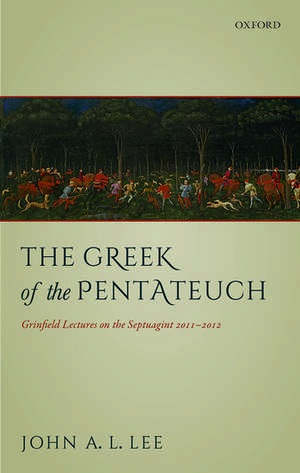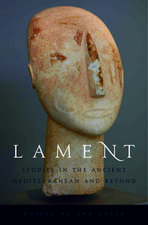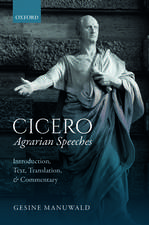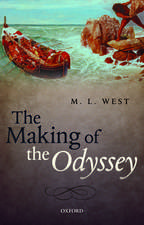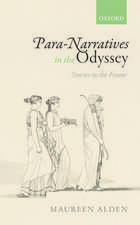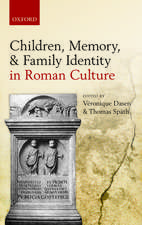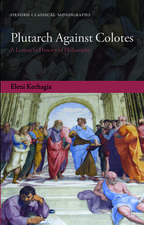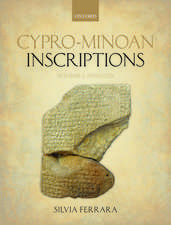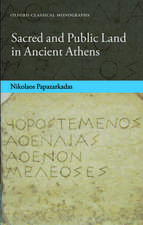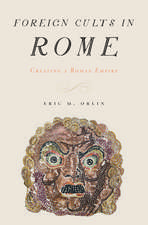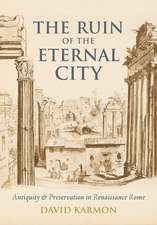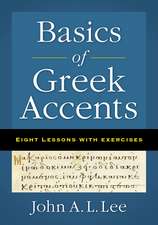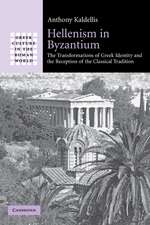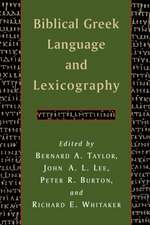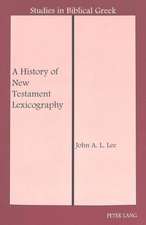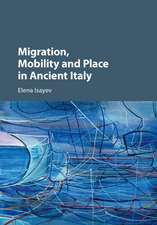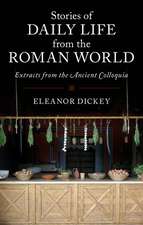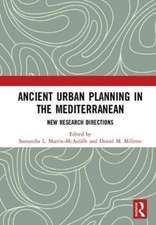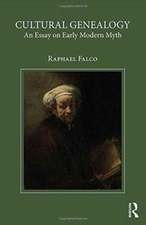The Greek of the Pentateuch: Grinfield Lectures On The Septuagint 2011-2012
Autor John A. L. Leeen Limba Engleză Hardback – 8 noi 2018
Preț: 629.29 lei
Preț vechi: 859.52 lei
-27% Nou
Puncte Express: 944
Preț estimativ în valută:
120.41€ • 125.72$ • 99.66£
120.41€ • 125.72$ • 99.66£
Carte disponibilă
Livrare economică 04-10 martie
Preluare comenzi: 021 569.72.76
Specificații
ISBN-13: 9780198816133
ISBN-10: 0198816138
Pagini: 384
Dimensiuni: 145 x 224 x 28 mm
Greutate: 0.61 kg
Editura: OUP OXFORD
Colecția OUP Oxford
Locul publicării:Oxford, United Kingdom
ISBN-10: 0198816138
Pagini: 384
Dimensiuni: 145 x 224 x 28 mm
Greutate: 0.61 kg
Editura: OUP OXFORD
Colecția OUP Oxford
Locul publicării:Oxford, United Kingdom
Recenzii
This volume will become required reading for anyone studying the LXX Pentateuch or, for that matter, the rest of the LXX corpus ... It is to be hoped that Lee's compellingly argued work will lead to a renewed appreciation for the language of the LXX.
All in all, L.'s intimate familiarity with the Septuagint and his knowledge of Greek linguistics make this one of the best books on the Septuagint currently available, and a real treasure-trove for students of the Septuagint.
While a technical read, this book is highly readable. Lee builds his case in a logical and convincing manner. Greek and Hebrew texts come with English translations... Lee's overall theme is helpful to understand in light of other literature on the Septuagint. The Pentateuch translators were adept at writing in Greek. Lee's methods for proving this is instructive and fascinating. Overall, his work is inspiring and impressive.
Without exaggeration, read everything he writes. And I would include the recent volume, The Greek of the Septuagint, to the list of essential reading... it is nearly impossible to disagree with John Lee's conclusion...
This is an interesting and engaging book for anyone who wants to wallow in the mechanics of Greek, with an interest in the Pentateuch. It contains much material for those who want to consider uses of the Pentateuch (and indeed Septuagint) in the New Testament. The book pays homage to Greek, and is a delight for any enthusiast to read.
This is a timely publication that continues and enhances Lee's stature as a leader in the field of Septuagint studies.
This is an excellent work of scholarship that points the way for future research. It repeatedly indicates questions that still need answering, and is full of examples of good practice. It should quickly become a standard reference in any work on Septuagint Studies and/or Koine Greek.
All in all, L.'s intimate familiarity with the Septuagint and his knowledge of Greek linguistics make this one of the best books on the Septuagint currently available, and a real treasure-trove for students of the Septuagint.
While a technical read, this book is highly readable. Lee builds his case in a logical and convincing manner. Greek and Hebrew texts come with English translations... Lee's overall theme is helpful to understand in light of other literature on the Septuagint. The Pentateuch translators were adept at writing in Greek. Lee's methods for proving this is instructive and fascinating. Overall, his work is inspiring and impressive.
Without exaggeration, read everything he writes. And I would include the recent volume, The Greek of the Septuagint, to the list of essential reading... it is nearly impossible to disagree with John Lee's conclusion...
This is an interesting and engaging book for anyone who wants to wallow in the mechanics of Greek, with an interest in the Pentateuch. It contains much material for those who want to consider uses of the Pentateuch (and indeed Septuagint) in the New Testament. The book pays homage to Greek, and is a delight for any enthusiast to read.
This is a timely publication that continues and enhances Lee's stature as a leader in the field of Septuagint studies.
This is an excellent work of scholarship that points the way for future research. It repeatedly indicates questions that still need answering, and is full of examples of good practice. It should quickly become a standard reference in any work on Septuagint Studies and/or Koine Greek.
Notă biografică
John Lee was trained in Classics at the University of Sydney, where he also learnt Hebrew. After gaining his doctorate in Cambridge in 1970, he lectured on Greek for nearly 30 years at the University of Sydney before retirement in 2001. His research interests are in Greek language, especially all forms of Koine Greek, and Greek lexicography. His doctoral dissertation was on the language of the Septuagint Pentateuch and his Grinfield Lectures on the Septuagint in Oxford (2011-2012) carried the same subject further. He is also known for his History of New Testament Lexicography (2003).
